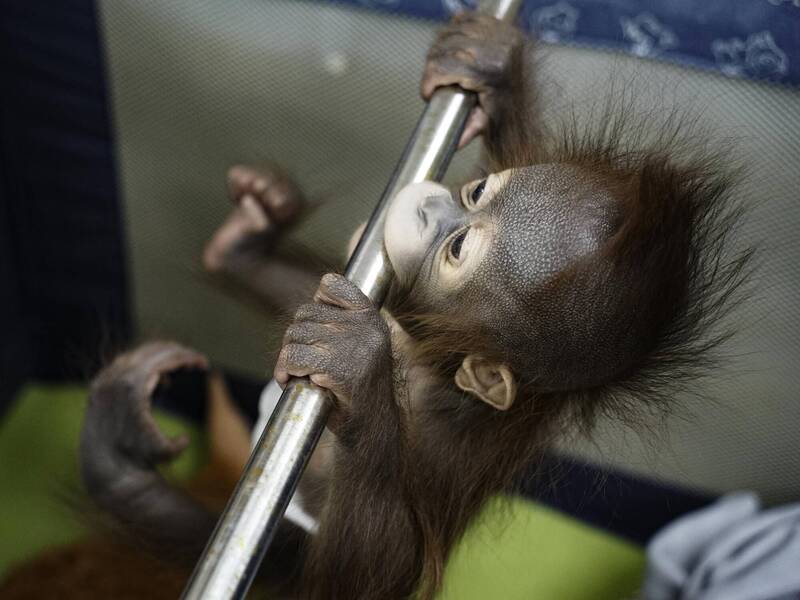Training the muscular endurance of the arms is an essential survival skill for young apes.
(Provided by Taipei Zoo)
[Reporter Cai Yahua/Taipei Report] The artificially-fed orangutan baby "Xiu Cai" at the Taipei Municipal Zoo is 3 months old and has an amazing growth rate. He can sit and crawl. Carrots, lettuce and other vegetables are mashed non-staple food. Usually, the nurses will also cut carrot strips or vegetable leaves, and let "Xiu Cai" put them in their mouths to suck them, so as to train their chewing ability. Physical training is even more important. The staff arranged "Xiu Cai" to exercise the muscular endurance of the arms, which is also a necessary survival skill for young apes.
The park pointed out that baby orangutans in the wild are able to move slowly when they are about 3 or 4 months old. At this time, the muscles of the lower limbs of the young apes are not yet strong, and they mainly use their arms and fingers to grasp and climb; research Staff have observed that in captive groups, orangutan mothers will strictly open their children's clawed fingers and move them from their arms to the climbing frame to exercise the muscle endurance of the young apes' arms and cultivate survival skills.
Please read on...
The nurse imitates the mother orangutan, and builds climbing sticks, lanyards and meshes in the pens as teaching aids for "Xiu Cai" climbing, grasping the lanyards and sticks with their fingers, and using their back muscles and biceps in mid-air Muscles defy gravity, and the aggressive "Xiu Cai" will even try to lift her legs to try to hook the rope. When her endurance reaches the limit, she will make a small cry and let the nursery staff quickly reach out to catch it.
The nurse revealed that the current level of "Xiu Cai"'s climbing is equivalent to the ability of a 4-month-old young ape. Although the grasp of the feet is still immature, and it often gets on the mesh but can't get down, it is already a gifted baby with advanced progress.
Through these physical training courses, the nurses hope that "Xiu Cai" can learn to move independently after 6 months, and return to her mother "Ke Xiu" as soon as possible to start a group life.
The park pointed out that according to research, orangutans in the wild usually do not completely break out of lactation and become independent from their mothers until they are 7 or 8 years old.
Compared with other wild primates, orangutans have an unusually long childhood, and the reproduction rate is slow. At the same time, the development of tropical rain forests has led to the disappearance of a large number of orangutans. We call on everyone to pay attention to the survival crisis faced by orangutans in the wild.
When the baby orangutan is three or four months old, the muscles of the lower limbs are not yet strong, and they mainly use their arms and fingers to grasp and climb.
(Provided by Taipei Zoo)
The nurses built climbing sticks, lanyards and nets in the pens as teaching aids for the orangutan baby "Xiu Cai" to climb.
(Provided by Taipei Zoo)
Physical training is another important daily lesson not to be missed at Xiu Cai.
(Provided by Taipei Zoo)
